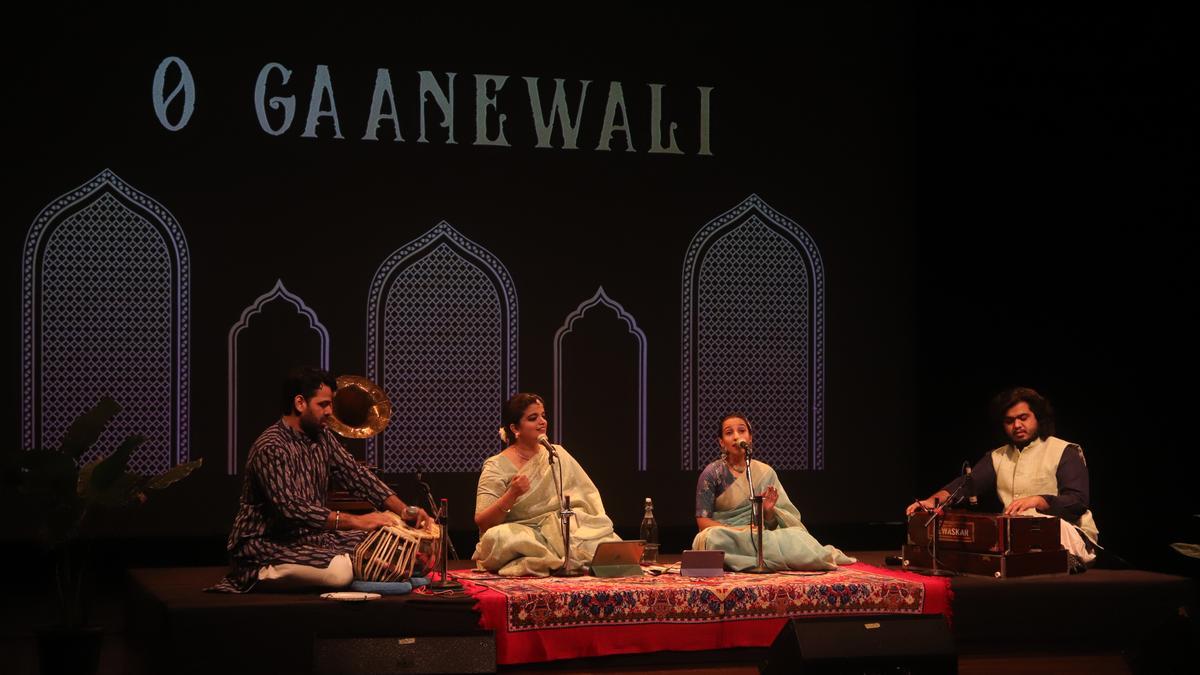
O Gaanewali, a music ensemble hailing from Mumbai, recently mesmerized the audience at the Bangalore International Centre with a performance steeped in rich history and cultural significance. As the first notes of Avanti Patel’s voice resonated through the hall, singing Kale baadal gher hai, one could imagine being transported to an era where the gaanewalis and nachnewaalis—the revered tawaifs of India—reigned supreme.
The evening was more than just a concert; it was an intoxicating mehfil that wove a tapestry of the lives and times of these remarkable women. The performance was a beautiful blend of melodious ghazals and compelling narratives that recounted the tales of these trailblazing artistes. As Avanti Patel, the producer and leading vocalist of the group, explained in an interview before the event, “I am never not going to talk about women. To have the female gaze in a ghazal is very rare — when it was in fact the ustaads and the pandits who co-opted this genre from the tawaifs.”
This lack of female representation in ghazals has prompted O Gaanewali to amplify the voices of the forgotten women behind these beautiful compositions. Vocalist Rujuta Lad shared insights into the rigorous and esoteric education these courtesans undertook, in stark contrast to the societal norms for women of their time. “These were highly intellectual women, fluent in languages such as Farsi and Urdu, despite it being considered inappropriate for respectable women to perform on stage,” Rujuta elaborated.
Among the ensemble were tabla player Akshay Jadhav, who together with Rujuta Lad and Avanti Patel provided the vocals, and Apoorv Petkar on the harmonium. Their camaraderie and musical synchrony were palpable. The deft interplay between Akshay’s tabla and Apoorv’s harmonium offered a harmonious backdrop to the hauntingly beautiful voices of the vocalists.
During the concert, Jadhav took a moment to explain the laggi ladi to the audience. “It’s a bit of a friendly war between the singer and the tabla player — we alternately give space to each other, for our creativity to shine,” he said with a chuckle. The ‘friendly war’ added a playful dynamic to the performance, enriching the overall experience for the audience.
. O Gaanewali’s artistry provided not just a musical experience but an enlightening lesson on the cultural history and musical craft of India’s tawaifs.
The group’s mission extends beyond merely performing music. “We want to make our shows accessible to the masses and we are big on imparting musical literacy during our performances,” said Avanti. She emphasized their ongoing efforts to break down barriers of elitism surrounding classical music, ensuring everyone has the tools to appreciate and enjoy their art. The group has scheduled upcoming concerts in Pune on August 23 and in Mumbai on August 31, continuing their mission to spread this enchanting music far and wide.
Throughout the evening, the audience was treated to timeless ghazals, including Gauhar Jaan’s ‘Mere Hazrat ne Madine mein manayee Holi’ and ‘Aaj jaane ki zid na karo,’ as well as pieces from other revered artistes like Janaki Bai Allahbadi and Farida Khanum. Each performance was met with sighs of recognition and vigorous applause, culminating in spontaneous waahs—signs of an enthralled and appreciative audience, as aptly noted by Avanti.
The performance method was notably interactive and immersive, creating a shared experience that resonated deeply with all present. “Magic is when everyone says waah unprompted,” Avanti remarked on the spontaneous expressions of awe that evening.
Ultimately, O Gaanewali’s performance was much more than just a concert. It was a tribute to the incredibly talented tawaifs—women who left an indelible mark on Indian classical music. The group not only entertained but educated, using their platform to highlight the significant yet often overshadowed contributions of women in the world of ghazals.
As they continue their journey, O Gaanewali remains committed to ensuring that these stories and songs reach as wide an audience as possible, breaking down the barriers that have long kept such art confined to the echelons of elitism. The audience left the event not just with melodies echoing in their ears but with a newfound appreciation for the rich history and cultural significance entwined within each note.












